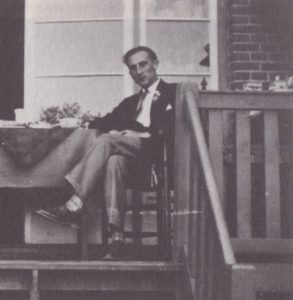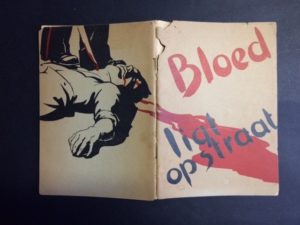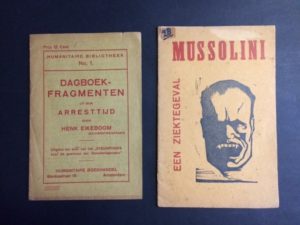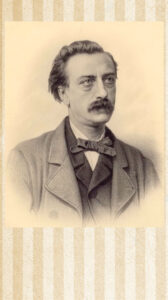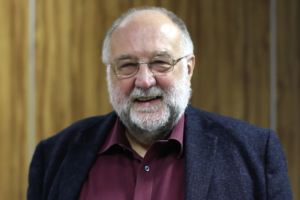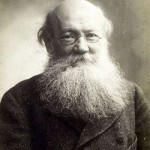De kruistocht van Henk Eikeboom
Henk Eikeboom (1898-1945) was geen theoreticus van het anarchisme, geen voorman in de anarchistische beweging, maar wel een man van agitatie, organisatie en actie. Hij noemde zichzelf sociaalanarchist, hij was antimilitarist en een bewonderaar van Domela Nieuwenhuis. Hij was dichter, redacteur van anarchistische tijdschriften, uitgever, vertaler, handelaar in tweedehands boeken en erotische lectuur. Tijdens de Tweede Wereldoorlog zette hij zijn publicatiedrift voort maar hij werd door de Duitse bezetter gearresteerd.
Henk Eikeboom werd geboren in 1898. Zijn vader was koster van de Muiderkerk aan de Linnaeusstraat in Amsterdam en boekbinder. Op de lagere school schreef Eikeboom zijn eerste gedichten en vertoonde hij al zijn opstandige karakter. Hij wilde graag onderwijzer worden, maar bleek later voor het vak volstrekt ongeschikt. Tijdens zijn opleiding tot onderwijzer kwam hij in contact met de Kwekelingen Geheel Onthouders Bond (KGOB) en de Jongelieden Geheel Onthouders Bond (JGOB). Mogelijk maakte hij via die organisaties kennis met het marxisme en de ideeën van Russische revolutionairen. Onder invloed van zijn latere vrouw Willy Broekman, ontwikkelde hij zich al gauw in de richting van het anarchisme.
Dienstweigeraar
Hoewel Eikeboom aanvankelijk tegen dienstweigering was, hebben waarschijnlijk de verschrikkingen van de Eerste Wereldoorlog hem tot andere inzichten gebracht en in 1917 weigerde hij dan ook op te komen voor de Landstorm. Bovendien had hij inmiddels kennis gemaakt met het tijdschrift De Wapens Neder van de Internationale Anti-Militarische Vereeniging (IAMV). Tussen 26 oktober 1917 en 7 januari 1919 werd hij als dienstweigeraar gedetineerd, onder meer in Fort Spijkerboor in Westbeemster. Gedurende zijn detentie hield hij een dagboek bij. Op zijn eerste dag in de cel schreef hij: ‘Zo zit ik dan eindelijk opgesloten in een cel (…). Vanmorgen heb ik geweigerd de militaire uniform (…) aan te trekken. Voorwaar een groote misdaad! Ik trek de uniform niet aan omdat ik vrede wil.’
Rapaillepartij
Gegrepen door het anarchisme en antimilitarisme, nam hij na zijn gevangenschap de propaganda voor het anarchisme serieus op. Hij ging schrijven – proza, poëzie en journalistiek werk – voor het anarchistische tijdschrift De Vrije Socialist en de bladen De Wapens Neder en Morgenrood. Van Morgenrood werd hij ook redacteur. Daarnaast hield hij spreekbeurten en deed hij bestuurswerk in anarchistische organisaties en antimilitaristische kringen. In 1919 werd hij administrateur bij Libertas, de uitgeverij van De Vrije Socialist van anarchistisch uitgever Gerhard Rijnders.
Een dienstweigeringswet bestond destijds niet in Nederland. Toen in 1921 dienstweigeraar Herman Groenendaal in hongerstaking ging om een wet te bespoedigen, werd de actie breed ondersteund. Henk Eikeboom zette zich fanatiek in door geld in te zamelen voor de actie. In dezelfde periode werd hij penningmeester van het landelijk comité van de IAMV.
Een van de meest spraakmakende acties waaraan Eikeboom deelnam was de oprichting van de Rapaillepartij. Samen met de dadaïst Anthon Bakels en kunstenaar Erich Wichman richtte Eikeboom een politieke partij op, juist om aan te tonen dat het algemeen kiesrecht nergens toe leidt en om de opkomstplicht aan de kaak te stellen. Ook wilden ze de vraag aan de orde stellen of de massa in Nederland wel een juiste politieke keuze kon maken. Lijsttrekker werd de Amsterdamse zwerver Hadjememaar, die tot ieders verrassing in de Amsterdamse gemeenteraad werd gekozen. Na één raadsvergadering hief de partij zich op.
Multatuli online
Multatuli – pseudoniem van Eduard Douwes Dekker (1820-1887) – wordt beschouwd als de belangrijkste schrijver uit het Nederlands taalgebied. Zijn invloed op de Nederlandse literatuur, de koloniale politiek, het feminisme en de arbeidersbeweging is baanbrekend geweest. Het Multatuli Genootschap/Stichting Multatuli Huis wil de belangstelling voor deze schrijver en denker levend houden door op multatuli.online zijn volledige werk en correspondentie en alle documenten (zoals teksten, afbeeldingen, archivalia) die op hem betrekking hebben digitaal en in samenhang te publiceren. De website is bestemd voor belangstellenden en onderzoekers maar ook voor wie hier kennismaakt met Multatuli.
De realisering van dit project zal stapsgewijs plaatsvinden. Op dit moment zijn alle zelfstandige publicaties van Multatuli aanwezig, alle bewaard gebleven correspondentie (ca. 5000 brieven), een biografie (door Dik van der Meulen) en het complete voor deze website gedigitaliseerde Multatuli Archief (eigendom van het Multatuli Genootschap en bewaard door Allard Pierson, De Collecties van de Universiteit van Amsterdam).
Daarnaast bevat de website een Multatuli Encyclopedie, een Multatuli Atlas, een Multatuli Lexicon en toegang tot een ruime hoeveelheid secundaire literatuur. Waar mogelijk wordt gewezen naar eerder gedigitaliseerde werken en documentatie, zoals te vinden bij de Koninklijke Bibliotheek (de Digitale Bibliotheek voor de Nederlandse Letteren en Delpher) en het Huygens Instituut.
Het colofon vermeldt alle personen en instellingen die tot nu toe een bijdrage hebben geleverd. Om een zo compleet mogelijk beeld van Multatuli’s werk en levensloop tot stand te brengen kunnen we de hulp van kenners en geïnteresseerden gebruiken. Wie over documenten – brieven, beeldmateriaal of secundaire literatuur – beschikt die hier niet mogen ontbreken of wie anderszins een bijdrage wil leveren aan multatuli.online (financieel of in natura), wordt van harte uitgenodigd om zich te melden bij de redactie van de website. Ook onjuistheden of suggesties voor verbetering kunnen aan de redactie worden doorgegeven.
Deze website is een initiatief van het Multatuli Genootschap en de Stichting Multatuli Huis. Door (fiscaal vriendelijk) donateur te worden ondersteunt u het werk van het genootschap en de stichting en verzekert u de instandhouding van deze website.
Bovenaan iedere pagina van deze website worden delen van de Multatuli Collectie getoond – brieven, documenten, manuscripten, foto’s, afbeeldingen en meer – om een indruk te geven van de rijkdom en de verscheidenheid van die collectie.
Bezoek de site: https://multatuli.online/home
Does the UK Need the EU? An Interview With Malcolm Sawyer
What was Brexit all about? What will its most likely consequences for UK, EU, and the world economy at large? Renowned British economist Malcolm Sawyer, Emeritus Professor of Economics at Leeds University, UK, discusses these and other related issues in an exclusive interview below with C. J. Polychroniou.
C. J. Polychroniou:Brexit has happened. The UK has gotten a divorce from the European Union (EU), after being a member for 47 years. Is this a cultural and political revolution?
Malcolm Sawyer: As of 11pm. (UK time) on 31st January 2020, the UK is no longer a member of the EU, and as such does not participate in the political deliberations of the EU (e.g. no longer any UK members of the European Parliament, UK government ministers do not attend meetings of council of ministers). However, during what is termed a transition period, intended to be completed by 31st December this year, very little has changed in the economic and social relationships between the UK and the EU. Trade continues to take place on the same terms as before, the free movement of labour between countries continues, etc. etc.. The economic effects of UK’s leaving of the EU are yet to be felt, e.g. those from changes in the trading arrangements. To date, there have been effects of the prospects of Brexit: the sterling exchange rate declined sharply shortly after the referendum from which it has not yet fully recovered, and investment has been subdued through uncertainty of the future relationships.
The referendum result was 52/48 in favour of leave over remain, and opinion polls since the referendum have tended to find some, albeit small, movement in opinion towards remain. The general election result of December 2019 resulted in a large Parliamentary majority for the Conservative government with Boris Johnson as Prime Minister, but based on a 43 per cent share of the national vote. The main political parties against Brexit without a further referendum, and against what is often termed a ‘hard Brexit’ (which is now the probable outcome) secured 52 per cent of the national vote.
At the present time, very little has changed in the day-to-day relationships between the UK and the EU. Trade relationships, movement of peoples etc will be decided upon over the next few months. It remains to be seen how co-operative will be the future relationships between the UK and the EU – much of the Brexit campaign has been based on hostility and suspicion of the EU, which undermine future co-operation. Brexit and the campaigns surrounding it have shown up deep divisions within British society.
C. J. Polychroniou: What are the implications of Brexit for the future of Great Britain, the EU, and the world economy at large?
Malcolm Sawyer: Future of UK. The result of the referendum (2016 on remain or leave the EU) revealed significant differences between age groups (old more likely to vote leave than the young), and geographical (cities more likely to vote remain than towns and rural areas). There were also differences between the constituent nations of the UK – England and Wales both voted to leave, and Scotland and Northern Ireland to remain.
There are forces which could propel a break-up of the United Kingdom with Scotland becoming an independent nation and Northern Ireland re-unified with Ireland. The pressures for independence in Scotland are enhanced by the UK leaving the EU, with a Scottish National Party (SNP) in power in Scotland (albeit as a minority government) continuing to push for a second referendum on Scottish independence. A majority of members of the Scottish Parliament favour independence (SNP plus Scottish Green Party) and recent opinion polls put support for independence slightly in the lead.
Deutsch-niederländische Geschichtswerkstatt zu Flüchtlingen in Amsterdam in der NS-Zeit
EXIL IN AMSTERDAM ZUID: DEUTSCHLAND AUF DER FLUCHT
Ein europäisches Gedenkprojekt
Deutschsprachige Flüchtlinge waren in der Nazizeit in Amsterdam im Exil: Frauen, Männer und Kinder aus dem heutigen Hessen, Baden-Württemberg, Rheinland-Pfalz, Nordrhein-Westfalen, Berlin, Bremen, Hamburg, dem Saarland, dem Elsass, aus Bayern, Schleswig-Holstein, Niedersachsen, Mecklenburg-Vorpommern, Sachsen, Thüringen, Polen, Tschechien und aus Österreich hatten in den Niederlanden Zuflucht gefunden. Bis zum Einmarsch der Wehrmacht 1940 waren sie dort sicher. Ihren Spuren nachzugehen und Rechercheergebnisse zu bündeln, um vor dem Hintergrund heutiger Flüchtlingsdebatten an die deutschen Flüchtlinge der NS-Zeit zu erinnern, ist ein Ziel dieses grenzüberschreitenden Projektes.
Der Bremer Geschichtsverein Lastoria lädt zum Mitmachen ein.
—
Unser Bremer Geschichtsverein Lastoria e.V. plant für Sonntag, 22. März 2020, 10 bis 18 Uhr, eine besondere Veranstaltung, die wir gerne rechtzeitig bekanntmachen möchten.
In der Villa Ichon, Goetheplatz 4, gibt es in unserem internationalen, interaktiven Gedenkprojekt “Deutschland auf der Flucht. Exil in Amsterdam Zuid 1933-1945” unter anderem Fachvorträge, Lesungen, Musik und einen Niederländisch-Kurzkurs.
Um freien Eintritt ermöglichen zu können, hoffen wir auf Spenden und Sponsoren.
Verschiedene Kooperationsformen sind denkbar. Für Vorschläge sind wir offen.
Wer etwas zum Programm beitragen möchte, sollte sich bitte umgehend melden, dann versuchen wir das Programm gerne zu ergänzen.
Ansonsten soll es an dem Tag aber auch reichlich Zeit für Gespräche geben.
Sobald Details geklärt sind, werden wir einen digitalen Flyer erstellen und in Deutschland und den Niederlanden versenden.
Dann sind auch Anmeldungen möglich.
Involviert sind bisher “Erinnern für die Zukunft” (Barbara Johr), “Aus den Akten auf die Bühne” (das Kooperationsprojekt des Geschichtsstudiengangs der Universität Bremen und der Bremer Shakespeare Company), Stolpersteingruppen in unterschiedlichen Bundesländern, eine Doktorandin der Universität Münster und An Huitzing von der Wolff Stichting in Amsterdam.
Monika Felsing
Historikerin und Journalistin
ehrenamtlich tätig im
Bremer Geschichtsverein Lastoria e.V.
mail@lastoria-bremen.de
Website: http://www.lastoria-bremen.de/akt038.htm
Max Brod On Franz Kafka (English Subtitles)
This is an interview with Max Brod, Kafka’s longtime friend and literary executor.
After Kafka’s death, Brod refused to comply with Kafka’s instructions to burn most of his work, instead seeing many of Kafka’s texts to first publication.
James Baldwin Debates William F. Buckley (1965)
The legendary debate that laid down US political lines on race, justice and history
In 1965 at the University of Cambridge, two of the foremost American intellectuals were challenged with the question: ‘Has the American Dream been achieved at the expense of the American Negro?’ From William F Buckley’s highly stylised posturing and pointing, to James Baldwin’s melodious rhetorical flourishes and memorable scowls, what’s become known as the ‘Baldwin-Buckley Debate’ now stands as one of the archetypal articulations of the dividing line between US progressives and conservatives on questions of race, justice and history. Baldwin, the famed African-American writer, whose reputation as a progressive social critic and visionary Civil Rights activist has only risen in the intervening decades, argues that the very foundation of US society is built on the dehumanisation of its African-American population. Meanwhile, Buckley, the leading US conservative intellectual of the period, argues that African Americans would be best served by exploiting their country’s many freedoms and opportunities, rather than pointing a collective finger at discriminatory structures and institutions. In both cases, their positions presage contemporary divisive debates in the US, though one wonders whether such an event could happen in today’s political environment.
While usually reduced to short clips, the full hour-long debate – presented here in its entirety – is a remarkable historical document in its own right. Conducted in front of a large, almost entirely white and predominantly male audience at the Cambridge Union, the encounter offers a sense of campus intellectual life in the mid-1960s through the atmosphere in the room, the things that made people laugh, and the particular references made by the debaters. After the always eloquent Baldwin evokes his personal experience to describe a perpetually disorienting and demeaning existence for African Americans, Buckley responds with facts and figures – as well as an ad hominem shot at Baldwin’s speaking voice – to argue that there’s an American Dream available to all those who would pursue it. In the end, Baldwin prevailed, earning an ardent standing ovation and a landslide victory in the Union’s vote on the motion raised.
From: https://aeon.co/the-legendary-debate-that-laid-down-us-political-lines-on-race-justice-and-history
